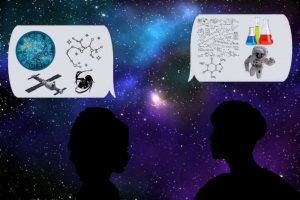
Pro by Madison Kitch
Many people live by life mottos such as “be kind” or “carpe diem,” but others look to the stars for guidance. Astrology’s roots can be traced all the way back to the Babylonians, where the stars allowed them to predict certain Astrological events and study the change of seasons. However, times have changed. Many Astrology skeptics don’t believe in Astrology because it’s no longer commonly considered a science, but it has withstood the test of time and remained a popular interest for the people.
Astrology is a multi-faceted system that has many different interpretations, and 58% of 18 to 24-year-olds believe that Astrology is scientific. It’s hard to believe that so many people would believe in something if it doesn’t have some sort of factual basis. As previously stated, Astrology has been around for a very long time. It shouldn’t lose credibility just because other methods of science have been introduced.
It’s also hard to deny the existence of Astrology when a person’s mood shifts at the slightest change. For example, it’s a stereotype that rain makes people sad; it might not be true, but sad quotes are always on rainy backgrounds. Stereotypically, sunshine represents happiness or joy. If the weather can impact someone’s mood, it’s not much of a stretch to say that a planet’s particular orbit also changes feelings. The moon has natural effects on the oceans’ tides, so it’s possible the stars have their effects on humans.
Statistics show that about 90% of adults know their sun sign, but the sun sign (the sign based on birthdays) probably isn’t always the best way to define someone. Many people are skeptical about Astrology because their sun sign doesn’t really apply to their personality.
A person’s Astrology chart is incredibly important to see the bigger picture. Believing in just one sign doesn’t work, just like how only having flour doesn’t make a cake. Unfortunately, many people only know their sun sign, and when it doesn’t apply to them, they get bored and do not care to learn the rest of their chart. If you’re interested in learning more about Astrology, visit The Astro Codex.
There are many aspects to Astrology, and it would take years to explain it all in one article. People who claim Astrology as completely false probably haven’t looked into their entire chart or are just determined not to believe. Astrology may not be for everyone, but for those who do decide to check it out: they won’t be disappointed.
Con by Valerie Perez
Living every day with the curiosity of what’s to happen next is the beauty of life. People, places, and things come and go, nothing is bound to stay the same. A horoscope cannot determine if a new soulmate will come within the next day or two. Better yet, if your next-door neighbor’s zodiac sign is compatible with your own. Meeting new people is inevitable. Determining if someone should be a friend or not shouldn’t be based off of the compatibility of zodiac signs or of a horoscope.
A subject that leaves many people confused is the difference between Astronomy and Astrology. Yes, they may sound similar, but they differ in so many ways. Zodiac signs and horoscopes pertain to Astrology (the study of celestial movements and their effect on human actions like personality types and everyday behavior). Astronomy is the scientific study of the universe because it uses theories that are proven correct. As NASA mentions, this ultimately leaves Astrology as unreliable since no evidence proves horoscopes and personalities as true. This leaves any app or website which gives predictions and forecasts essentially false.
Astrology is the most predominantly known Pseudoscience (a belief or practice that is mistakenly known to follow a scientific method). This is why many people today commonly mistake Astronomy as true since it involves the study of planets and stars. The characteristics and personality traits derived from the positions of the planets do not hold factual or correct information. Most astronomers don’t involve themselves with astrology because of the belief of Astronomy being one of the worst Pseudoscience.
Most of the articles and apps that explain horoscopes have a diverse and general explanation of each of the signs. People find themselves to somehow relate to the information and coordinate it to their lives. Even though the information does not necessarily connect with their life, many are gullible and will trick their minds to believe these generalizations. This phenomenon is called the Barnum Effect or the Forer Effect in Psychology and is widely used to grab the reader’s attention. Before looking at the new notification of today’s horoscope, stop and don’t just believe it.
Many writers who create a column for horoscopes do not have a background working or studying the subjects involving it. Astrology is solely for entertainment purposes. No reliable information comes from horoscopes since there is no proof or hard evidence. It’s all just a way to gain more readers, so don’t fall into the trap of their so-called “reality.”










